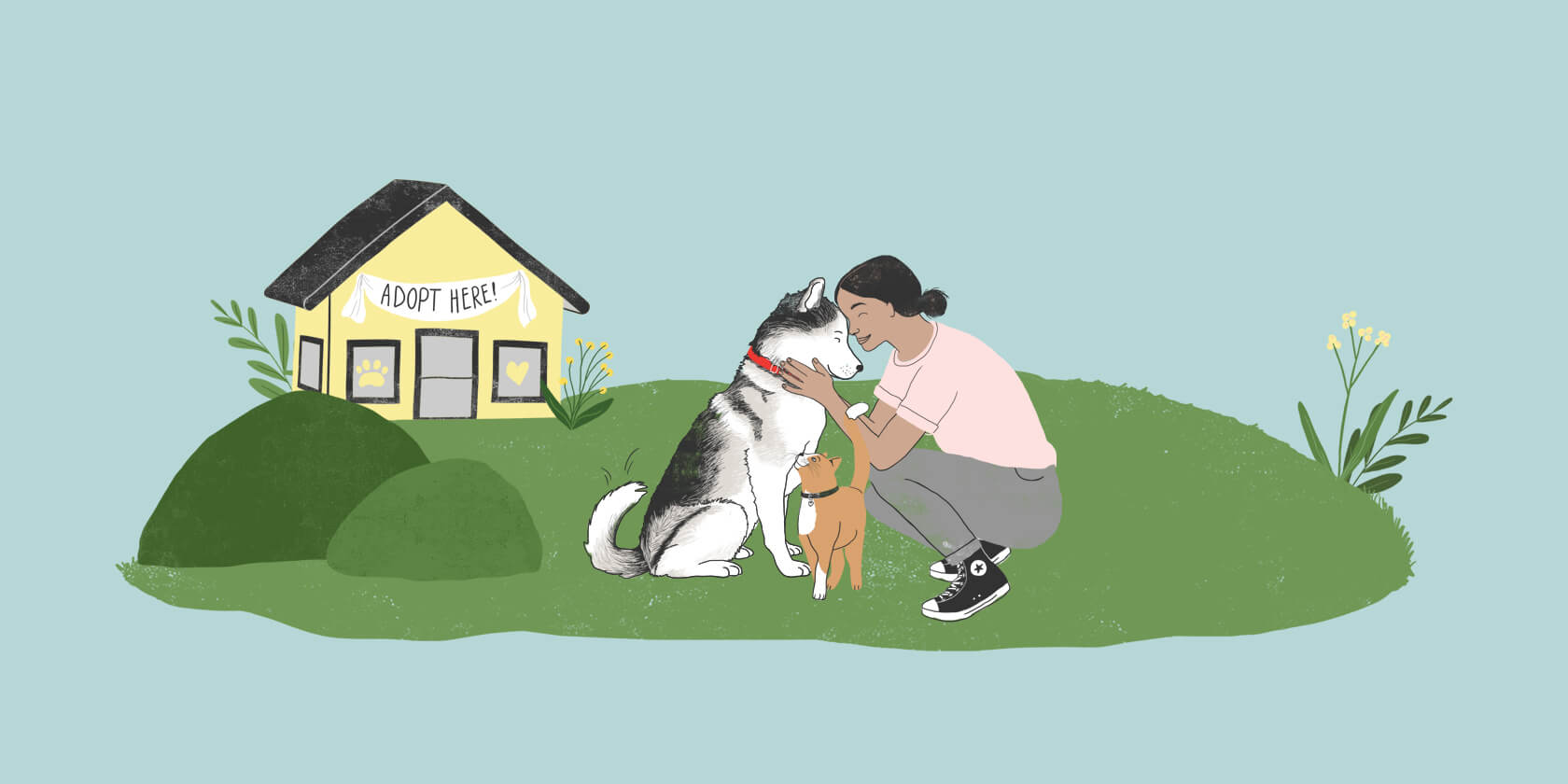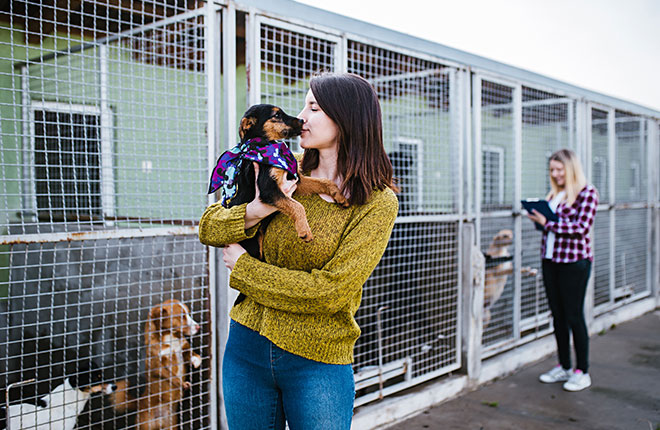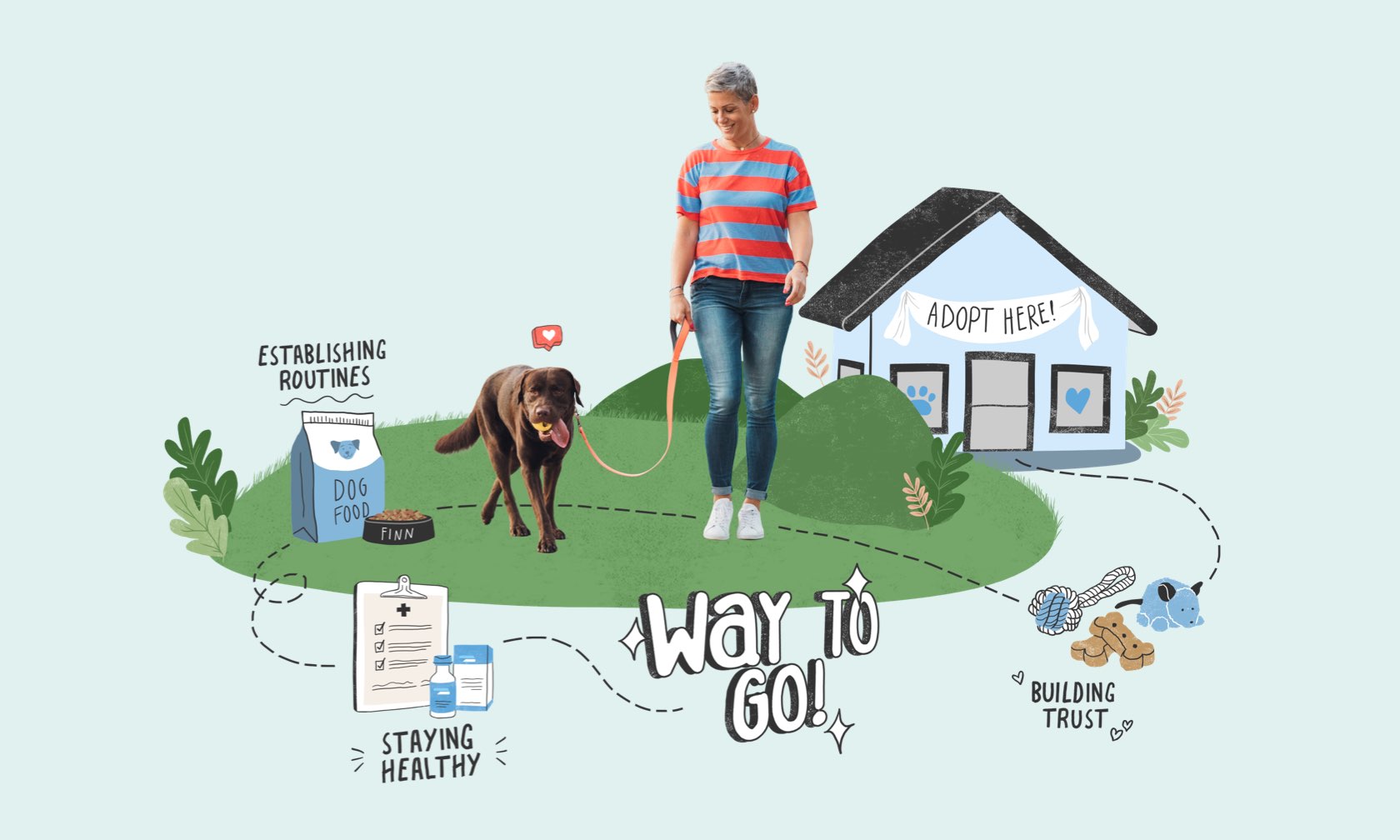If you're ready to add a new dog or cat to your life, you have a few options for where to find or adopt a pet. Where you get a pet can be determined by what you're looking for, whether it's breed, age, size, temperament or energy level.
In the United States, the majority of pets are adopted — 38% of dogs and 50% of cats are found through shelters or rescue organizations[1]. When it comes to finding a new dog, breeders are another popular choice, as 1 in 4 dogs are purchased from professional breeders[1].
There are benefits to getting your new dog or cat from a shelter, rescue, or breeder, depending on your needs.

Shelters and Rescues
Shelters and rescues both work to help find homes for dogs and cats in need but are different in a couple of ways. Animal shelters are often funded and sometimes run by local government or private organizations and have a physical location where they house the animals. Rescues are privately run organizations that mostly rely on their foster volunteers to house and care for the animals. Often you will see shelters and rescue organizations working together to ensure that dogs and cats are in the best environment for any behavioral or medical needs, and to increase adoption rates.
Local animal shelters and rescues do great work in helping animals in need of a new home and can help you find a great match for your lifestyle. Puppies and kittens are adopted out quite quickly from shelters and rescues, so if your heart is set on a pet this age, you'll need to stay on top of what pets are available at any given time and be willing to wait a bit longer to add a furry friend to your family.
When adopting a puppy, remember that it can be tough for shelters to know exactly how large they'll grow or what coat type they might end up with if they don't know these things about both parents.
Adopting a rescue dog or cat from a shelter means that you might not know their history when it comes to behavior or previous medical issues. Animals staying in a shelter might not feel comfortable expressing their normal personality in that more stressful environment, but don't be discouraged. When you adopt a pet from a shelter, they'll need some decompression time to acclimate to their new home and feel secure enough to let their personalities shine! Adoption counselors at shelters are a wealth of information in learning about your new dog or cat's needs and how to make that transition period easier.
Rescue organizations often know more about the regular behavior of their available animals, as they get to see the dogs and cats in a more natural home environment of foster care. You can also find rescues dedicated to specific pet populations or issues, such as a particular breed, size, or even senior or special needs pets. You can find a breed rescue for almost any breed. So, if you want a particular breed, this is a good way to rescue, but still get a certain breed. If you have an idea of what you're looking for, adopting a rescue dog or cat may be a faster process than waiting for that particular combination of dog or cat attributes to pop up in the shelter population.
Breeders
Professional breeders of dogs and cats are a resource for people looking for particular breed characteristics or behaviors. Breed rescues will also be knowledgeable about characteristics and concerns about that breed. Humans have been breeding dogs to perform different tasks over centuries, while selective cat breeding has grown more popular in more recent times. This has led to quite a variety of dogs, with 193 recognized breeds by the American Kennel Club[2], compared to only 42 cat breeds recognized by the Cat Fanciers’ Association[3].
Reputable breeders are careful to breed for temperament and health characteristics, as well as good looks. Many also will test for inheritable medical conditions in an effort to prevent these from being passed on to new generations. Good breeders invest a lot of time and resources into making sure that their puppies receive the best start to life as possible, and take excellent care to not overbreed their dogs. A reputable breeder will work closely with a veterinarian to ensure the health of the puppies and kittens. You should expect a rigorous application and screening process to purchase a puppy from a reputable breeder, as they are making sure that their dogs go to homes that are best suited for their breed and are ready for a lifelong commitment.
If you know that you want a particular breed, and especially if you want a puppy, a good option is connecting with a breeder — 24% of dogs in the United States are acquired from a breeder[1]. Breeders aren’t only for puppies either — they will often have young adult dogs of their breed available for placement with families. It is important to do your research when buying from a breeder to make sure they are not a puppy mill. Ask to see where the parents are housed, to see a veterinary record and most breeders will not have many different types of breeds or too many litters a year.
Wherever you decide to get your new dog or cat, you will set yourself up for success by considering your goals and expectations for yourself and your new pet. Also, make sure to ask your veterinarian for advice and recommendations on getting a new pet. Adopting a rescue cat or dog is an incredibly rewarding experience and helps animals in need. In some cases, connecting with a breeder can be the best choice when it comes to personal preferences or goals in training or dog sports, or when searching for a particular breed of cat. Your new furry family member will thrive in your home with love, patience, and consistency, no matter where you got them from!
ZPC-00587R1
- America's Pet Owners – US – August 2019. Mintel. 35–59.
- Breeds by Year Recognized. American Kennel Club. https://www.akc.org/press-center/facts-and-stats/breeds-year-recognized/. Accessed January 15, 2020.
- CFA Cat Breeds. Cat Fancier's Association. http://www.cfa.org/breeds/. Accessed January 15, 2020.



